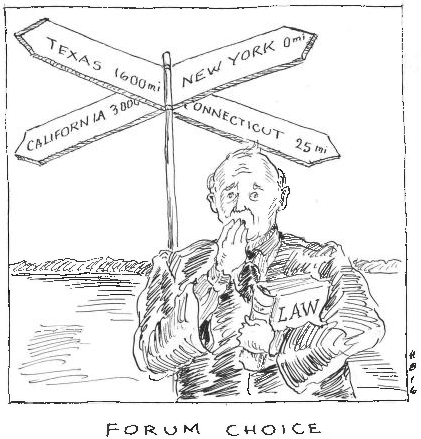

Spreading the (sovereign) wealth…(Second Circuit). Foreign Sovereign Immunities Act permits federal securities fraud claims against Kazakhstan’s sovereign wealth fund. Court finds that alleged misrepresentations outside the United States had a “direct effect” on U.S. investors.
Atlantica Holdings, Inc. v. Sovereign Wealth Fund Samruk-Kazyna, JSC, 813 F.3d 98 (2d Cir. Feb. 3, 2016)
Under the Foreign Sovereign Immunities Act (“FSIA”), a foreign sovereign has general immunity from suit in the U.S., subject to certain exceptions, including one for the foreign state’s “commercial activity.” When the commercial activity takes place outside the United States, the commercial activity exception applies if the activity “causes a direct effect in the United States.” 28 U.S.C. § 1605(a)(2). Atlantica Holdings addresses two important aspects of this “direct effect” clause.
First, the requisite direct effect may be an effect upon any United States investors (whether parties or not). Plaintiffs asserting this basis for jurisdiction may be either U.S. or foreign investors; the absence of any U.S. investor plaintiffs is not a bar to jurisdiction.
Second, when the United States is the locus delicti—or “place of the wrong”—there is a “direct effect in the United States.” Previous decisions recognized that the United States is the place of the wrong in contract cases when “the United States is the place of performance of the breached [contractual] duty.” For tort cases, however, the place of the harm is not the place of the breached tort duty—here, the misrepresentations—but the initial place where the tort victim suffers harm from the breach. In a fraud claim alleging purely financial loss (as contrasted with financial loss that is derivative from some other harm, such as loss of property in a conversion), the place of the loss is typically the tort victim’s residence.
Read the court’s full decision here.
Court boots footwear distributor out of Australian proceeding… (NYS Supreme Court, Commercial Division). Contractual choice of New York as an exclusive forum prohibited Australian distributor from pursuing litigation in Australia against subsidiary of well-known footwear designer Steve Madden. NY court issued a rare anti-suit injunction.
Madden Int’l, Ltd. v. Lew Footwear Holdings Pty Ltd., No. 650209/2015, 2016 WL 237637, 2016 N.Y. Slip. Op. 50061(U) (Sup. Ct. N.Y. County Jan. 15, 2016)
New York has a “strong public policy” of enforcing contractual choice of forum clauses between “sophisticated business entities,” particularly where one of the parties is based in New York. In this action arising from the termination of a licensing and distribution agreement, the court enforced this public policy in the face of the distributor’s “purposeful disregard of its contractual obligations in favor of an unsanctioned suit in its home country of Australia.”
The court characterized this case as particularly “thorny” because the Australian court previously declined to enforce the parties’ choice of forum agreement on public policy grounds, reasoning that the distributor’s statutory claims against Madden for deceptive trade practices under Australian law had no analog under New York law and would be unavailable to the distributor in the New York proceeding. Nevertheless, the court stepped in to award the very rare relief of an anti-suit injunction.
Read the court’s full decision here.

“Extraordinarily unlikely” and “truly exceptional”…Second Circuit decision underscores the difficulty of establishing general personal jurisdiction over out-of-state corporate defendants even where they maintain a substantial physical presence in the forum state.
Brown v. Lockheed Martin Corp., 814 F.3d 619 (2d Cir. Feb. 18, 2016)
In Daimler v. Bauman, 134 S.Ct. 746 (2014), the United States Supreme Court made it very difficult (if not impossible) for plaintiffs to establish general personal jurisdiction over out-of-state (including foreign-country) corporations under a traditional contacts-based theory. Daimler left open the possibility that, “in an exceptional case,” a corporation might be amenable to general jurisdiction in a state where it is neither incorporated nor maintains its principal place of business. But the Second Circuit in Brown deemed it “extraordinarily unlikely” that an out-of-state corporation’s contacts with the forum state—“no matter how ‘systematic and continuous’”—will ever “add up to an ‘exceptional case’” sufficient to confer general jurisdiction.
In this case, Brown sued Lockheed Martin in Connecticut based on asbestos exposure that took place outside Connecticut. Lockheed was neither incorporated nor maintained its principal place of business in Connecticut. The Second Circuit declined to find general jurisdiction based solely on Lockheed’s longstanding physical presence in Connecticut, which the court held did not make for “a truly ‘exceptional’ case” under Daimler. The court also declined to construe Lockheed’s registration to do business in Connecticut and appointment of an agent for service of process there as a consent to general jurisdiction.
In dicta, the court noted differences between Connecticut’s registration statute and New York’s analog. The Court observed (without holding) that New York’s registration statute might subject a registered foreign corporation to general jurisdiction in New York, and that legislation pending in New York would make that rule explicit. The court raised the question whether that legislation might violate the United States Constitution’s Due Process clause, but the court gave no indication how it would rule on that issue, which was not immediately before it.
Read the court’s full decision here.
Stay informed of Chaffetz Lindsey’s updates, new articles, and events invitations by subscribing to our mailing list.
